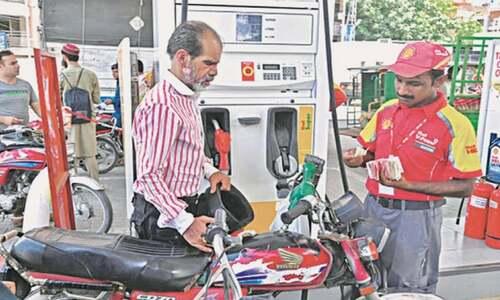KARACHI: Traces of plastic and rubber additives have been detected in the remains of four Keamari toxic emission case victims whose bodies were exhumed over a month ago by a special medical board formed by the Sindh government on court orders, it emerged on Saturday.
Sources said officials had received the reports on the samples collected from the four victims — Razia, in her 30s, her 19-year-old married son Shoaib, and her two young children, two-year-old Shahid and one-year-old Haleema.
The reports are prepared by the University of Karachi’s Industrial and Analytical Centre.
The reports, a copy of which is available with Dawn, revealed that multiple samples collected from the scalp hair, teeth, femur bones, brain matter, chest and abdominal cavities of the victims had traces of plastic and rubber additives.
According to the reports, these traces were also present on the pieces of shrouds and the mud below the shrouds that were collected from the site.
“No traces of any other toxic chemicals, toxic gases, heavy metals, sedatives, narcotics, psychotic substances, or poisonous substances were found,” the report stated.
“While this evidence does not conclusively suggest the cause or causes of death, it does definitely indicate that the victims were living in a highly polluted environment, posing a serious threat to their health,” said an official privy to the investigation.
The final report would be prepared by the police surgeon, he added.
The sources stated that there were serious lapses in the Keamari case investigation from day one. For instance, they said, no serious effort was made to collect evidence/traces of environmental pollution, which was initially highlighted as the cause of multiple deaths.
Information gathered from multiple sources revealed that the health department could not carry out a single detailed autopsy when reports about the deaths were flashed in the media. Hence, a critical source of evidence was lost.
Secondly, the Sindh Environmental Protection Agency (Sepa) collected air quality samples after the factories, blamed for toxic emissions, were sealed.
“That, too, is done through a private laboratory that requires annual certification from Sepa. Thirdly, there was no effort to analyse the material and waste being used and generated by the factories and see how they could affect human lives,” a source privy to the case’s developments said.
The source pointed out that one of the nearby factories produced iron ore that caused harmful gases.
Officials should have checked the presence of toxins in blood samples, which were collected from a section of the ailing population and sent to the National Institute of Health (NIH) for analysis, he added.
It might be recalled that the Sindh health department had constituted a medical board in February for the exhumation of the bodies of 18 people who died in January this year, allegedly from inhaling toxic emissions from Keamari’s Ali Muhammad Goth.
The victims, most of them children, were also found to be infected with measles.
The six-member board was formed in compliance with the order of a judicial magistrate, who had allowed an application filed by the police for the exhumation of the bodies so that their post-mortem examination could be carried out to ascertain the exact cause of their deaths.
Led by Dow Medical College Principal Prof Saba Sohail, it included Prof Naseem Ahmed, head of the pathology department at the Dow University of Health Sciences (DUHS); Prof Zakiuddin, head of forensic medicine at the DUHS; a senior female medico-legal officer; and the district health officer, Keamari.
Published in Dawn, March 26th, 2023














































Dear visitor, the comments section is undergoing an overhaul and will return soon.